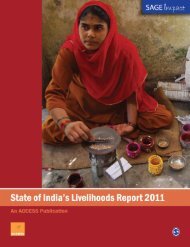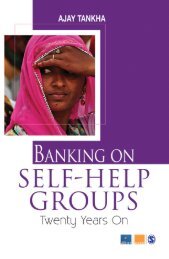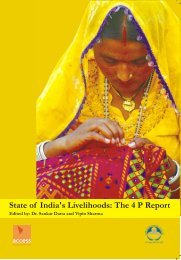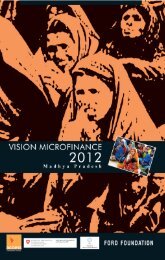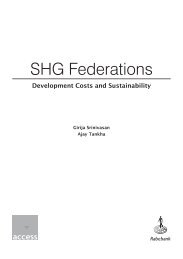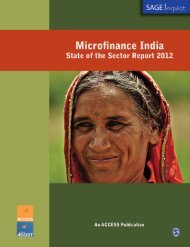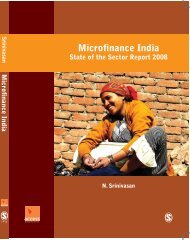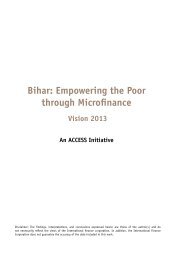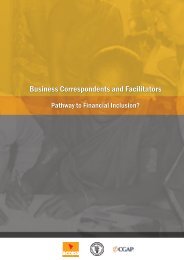Download sector_report1.pdf - Microfinance and Development ...
Download sector_report1.pdf - Microfinance and Development ...
Download sector_report1.pdf - Microfinance and Development ...
You also want an ePaper? Increase the reach of your titles
YUMPU automatically turns print PDFs into web optimized ePapers that Google loves.
MFIs: Learning from the<br />
AP Crisis<br />
Box 4.2 Some Not Easy to Answer (NEA) questions calling for further<br />
research <strong>and</strong> consensus building<br />
What constitutes abusive collection methods<br />
Group lending is built on the foundation of joint <strong>and</strong> several liability (also referred to as<br />
social collateral, or a collateral substitute) This applies equally to SHGs, where the lender is<br />
not concerned with the identity of the individuals to whom the loan is distributed by the<br />
group, <strong>and</strong> to smaller Grameen-type groups where loans are recorded in the names of individual<br />
borrowers. Joint liability, although theoretically enforceable in the latter case through the<br />
courts (because other group members sign the necessary documents), is in practice enforceable<br />
only morally through peer group pressure.<br />
The strictly moral component of peer group is the sense of obligation that group members feel<br />
to repay their loans. In India, as in Bangladesh <strong>and</strong> perhaps elsewhere, poor village women<br />
take the oath they are administered when becoming members extremely seriously. The other<br />
more opportunistic component of peer group pressure derives from the incentive to repay as<br />
the condition for receiving larger loans or continuing to receive credit at all.<br />
The NEA question is, can MFIs rely on these two components alone, <strong>and</strong> if not what other<br />
methods are ethical There was much talk during the AP crisis of MFIs keeping borrowers<br />
st<strong>and</strong>ing in the sun waiting for the last member of the centre to turn up with her loan<br />
payment. A field worker from a rival MFI felt this was unacceptable (as most people would).<br />
But when asked "how about keeping them waiting sitting down, in the shade" she replied:<br />
"Well perhaps, for a while …." In the memorable words of an IIMB professor "you don't recover<br />
loans by smiling at people". However at what point does embarrassing a borrower for keeping<br />
everyone waiting by coming late to a meeting with her repayment, become unacceptable<br />
humiliation<br />
What constitutes over-lending<br />
It is not easy to define the tipping point beyond which a borrower over-borrows. Clearly when<br />
borrowers default involuntarily they have over-borrowed, but not all over-borrowing leads to<br />
default, as when a borrower sells a valuable asset, or cuts back on educational expenses, or is<br />
forced to work when ill in order to meet the next weekly instalment. Group lending leaves it to<br />
the good sense of group leaders to take a call on whether to chip in for a "deserving" defaulter.<br />
But what are the ethical considerations when they are not prepared to put up for a willful<br />
defaulter who then migrates out of the village or worse. Instances of excessive peer group are<br />
not the monopoly of MFIs. There are documented cases of SHG members contemplating suicide,<br />
<strong>and</strong> it is st<strong>and</strong>ard practice in the bishis or informal credit unions of Maharashtra for the entire<br />
membership of perhaps 50 to a 100 people to visit <strong>and</strong> embarrass a defaulter in her house,<br />
perhaps even restraining her inside temporarily.<br />
When does healthy competition become unhealthy<br />
What constitutes poaching, merely lending to a borrower when she has a loan outst<strong>and</strong>ing to<br />
an existing lender A libertarian in these matters would advocate respecting her freedom of<br />
choice to avail of a larger or more timely loan. Is there an obligation on the new lender not to<br />
lend to her until she has fully repaid her existing lender Or is the lender only obliged to<br />
ensure that she will be able to pay back both loans Is it necessarily irrational to borrow from<br />
a higher cost moneylender for a few days to repay an MFI "Double dipping" is said to be<br />
widely practiced in Bangladesh. What have been the effects<br />
71






